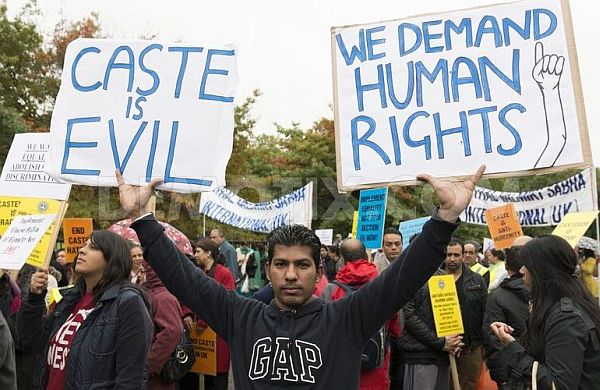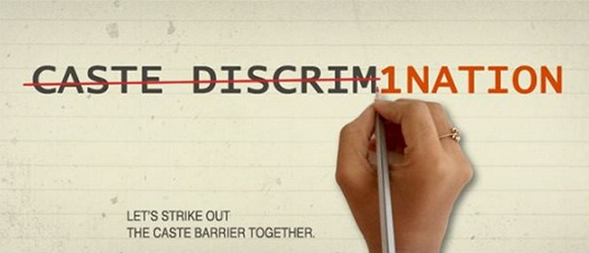Casteism is a weird thing and I still can’t wrap my head around it. I have been way more privileged than my ancestors who struggled to be a part of the society so driven with hatred against the ‘lower castes’. I went to a convent school where I wasn’t made aware of my caste for a really long time because we didn’t talk stipend or reservation. My family was quite well to do, too and I grew about without realising the complexities of this oppressive system.
I was in 3rd standard when in the history book, it was written that Gandhi took the ‘untouchables’ under his wings and called them ‘children of God’. My 9-year-old innocent self-thought ‘bichara ko hola untouchable haru..gandhi is so nice’.
I was in 8th standard when I had a fight with a girl in school and she yelled ‘sala kami’. It was weird for me because first of all, I’m Damai. Second, I didn’t know how this was supposed to be an insult. But now that I think of it, she had learnt how to use it as an insult at such a young age. A convent educated girl. So for the ones who say casteism doesn’t exist in ‘high societies ‘, it very much does.
In 10th standard, while filling the form for ICSE, is when I realised I am what is called scheduled caste. At this, one of my friends went ‘omg you’re a Damai?’. It was a big deal for others, I couldn’t understand why.
In 11th I started dating a guy. About 6 months later, a cousin of mine got surprised at this. She asked me, ‘have you told him about your caste?’ I didn’t know that mattered. She knew. I shrugged it as a very weird thing to address, unaware that eventually he would be pressured by his brahmin family into leaving me when we were only in school. Why? Because I was a certain caste. Not because we were kids.
By then, the stigma of being a ‘Damai’ had already implanted a deep shame in me. I wasn’t sure why…but I would hope nobody would ask me about my caste. My grandmother was a graduate. My parents were government officers. A close relative (Harshita Sharma talking about Lalit bajey) was the only IAS officer in the district. The lady who helped us with the household chores was a Chettri. I didn’t understand why my identity stopped at being a low caste. I didn’t understand why I was different than the rest of them.
College taught me a lot about all of this. More so because I was a student of social sciences and we had amazing professors who address my guilt about using my caste certificate for a seat. The stipend was another benefit although we had to fake an income certificate. “If you don’t take it, the government is going to waste it anyway. Take it as a compensation for being made to feel less”. My dad wasn’t in favour of it. He would say I’ll give you that 10k, why will you run around for that money? But I took it anyway. Cuz a college student always needs money.
I found a very good friend in Atisha Sunar whose mother is a Chettri. Prestiged Presidency University students, Atisha and I, got involved in a minor fight with another girl from Darjeeling. Her boyfriend yelled “sala kami ko beura na dekha”. Kamta dhulai bhetena tya bata tyo keti le hamro bata.

Thus started my journey of caste awareness. It started with being unapologetic about being a Damai. About being born to this beautiful family with a beautiful ancestry of hard-working people who were oppressed so systemically. A family that worked hard despite that and made me this person at par with the people who oppressed them.
I learned about Babasaheb Ambedkar who made this possible… a name that gets lost in our history textbooks. I realised that the Eklavya story we were taught in school as kids, about guru-reverence, should’ve been actually taught as caste oppression by a ‘high caste’ who couldn’t tolerate a low caste being so good at a skill that as a gift, he asked for the finger that would take Eklavya’s skill away.
I started to wonder if despite all this privilege people look down upon me and insult me, what must’ve been the plight of my ancestors …. what must be the plight of the sea of Dalits still being oppressed and their voice was taken away. Why do people think they are superior to a whole section of society only because they happened to be born in a certain family of a certain caste? Why are the educated lot still complaining about reservation?
In 2017, I went to Nepal for the first time. I had heard that Nepal people are way casteist than people in Darjeeling could ever be. And it was true. “What is your caste?” was a very important question to ask people, even before asking their name. I realised I couldn’t escape this for long. I had to fight my own demons. What would they do if they got to know? Make me eat in a different plate? Look down upon me? I stopped caring.
And it started. People asked me my jaat wherever I went. My reply ‘Damai’ kept getting steadier, louder, and more confident. Their reactions were varied, it was borderline amusing. Some said, “But you don’t look like one”. Some said “haha. Don’t mess with me. C’mon, tell me the truth”. Some said, “oh, no no, we don’t believe in caste anymore”. Some made a face and looked away and didn’t talk to me like they did with others.
Funny how people find it hard to believe that a Dalit can speak better English than them, can dress well, is fair-skinned, and has a good education. They didn’t let it happen but here we are, throwing it in their casteist face.
A young guy, about 26-27, in Kathmandu, who was hitting on me non-stop asked me about my caste. I thought he was kinda cool until then. I was surprised because I really had hoped that this generation wasn’t all about that. I asked him why it was important. He said, and I quote, “It’s a very important identity. It’s more important than your nagarikta. It’s like your voter ID.”
I was instantly pissed so I retorted with “Tei karan desh ubo na lageko”…. but this still haunts me.
I am still advised to not date a Bahun guy because his family won’t accept me. Probably kick him out of the family and ostracize us.
I see woke savarnas posting stuff online but won’t really do anything about it. Will stick to marrying within their caste, or any caste but not a Dalit…because, “that’s how it is” .. ” we can’t change it overnight”. They don’t realise what effect their small effort will have.
I can write this in a language the privileged will understand, yet I can’t remotely include the humiliation and struggle of the majority of Dalits who are suffering because they were born to a particular caste. I can’t begin to comprehend the trauma they have been put through all their lives.
A pregnant woman was killed in UP for mistakenly touching an upper caste woman’s bucket. A boy and his friends were killed in Nepal for daring to love an upper caste girl. Yet another Dalit who managed to get education was shamed for using reservation and was shrugged off as ‘rich dalit’.
What exactly will it take for #Dalitlivesmatter to trend on social media?
One day it will end. It will. It’s perhaps way more than a century away, but it will end. And when it is penned down in the history textbooks finally, which side would you want to be on?
Writes: Dristhi Bagdas



Thank you for sharing your knowledge and loved experience of this with us.